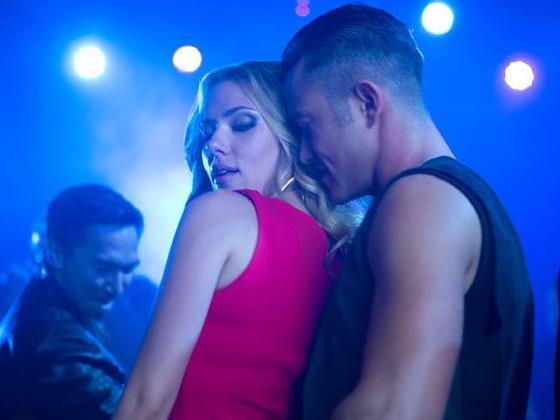Image: Scarlett Johansson as Barbara Sugarman and Joseph Gordon-Levitt as Jon Martello.
Jon Martello (Joseph Gordon-Levitt, Lincoln) lives in a world of fantasy. A world of recurrent, meaningless physical encounters with women courted by darkness and spurned by daylight. A world of idealised, readily-available images of unrealistic sex that provide his real cathartic outlet. Jon plays the one-night-stand game with style and swagger, but pornography remains his true first love. As much as the New Jersey-based smooth-talker is attracted to the ladies he meets, nothing comes close to the release elicited from the constant stream of erotica available on his computer. Reality just isn’t enough.
Barbara Sugarman (Scarlett Johansson, Hitchcock) similarly inhabits an illusory construct, but of the much more socially acceptable variety; it is devotion – of a man willing to change his ways and bend his will for her affection – that she covets. Her consumable of choice is romantic comedies, embraced with almost the same frequency and fervour as her suitor. Her air of confidence and ability to prolong consummation ensnares Jon into the pursuit not just of a single evening, but a relationship; yet, her attempts to shape him into the man she wants is at odds with his deep-seeded porn addiction.
Though the film bears Jon’s name, the prefix playfully referencing his lothario status, it is not only his but also Barbara’s idylls that are interrogated – the hyper-sexualised and the over-romanticised providing a stark contrast. Don Jon cleverly charts its protagonist as he wades through the ramifications of both, balance seemingly impossible as they clash with comedic purpose. The feature’s modus operandi, both written and directed by Gordon-Levitt in his first stint with the full-length form, is to perceptively and amusingly peek through the veil of each extreme to move towards an earned, earnest equilibrium.
The slight and the sweet collide as Jon starts out as sleazy and shallow as expected, then transitions into all the right signs of commitment, before lurching towards something less staged and more authentic. Lightness emanates every step of the way, with the film throwing substance but never too much seriousness into the mix. Beneath the fun and the funny, the stereotypes as shorthand and the broad statements, exists truth that belies the overall upbeat mood. Jon is defined by his predilection, but his journey is not; the character is allowed, within realistic bounds, to grow and change. His story, by design, is of course universal – but it is also sincere. In Don Jon, even the most charismatically cringe-worthy of nightclub charmers, all sexual bravado and no emotional follow-through, can understand the necessity of honest, person-to-person interactions.
As a director trying to navigate the morally-complex minefield with an atmosphere not just of insight, but of the right kind – and constant delivery – of levity, Gordon-Levitt has assembled many impressive feats, not the least of which is his penchant for aesthetic flourishes. With an assured eye and hand, he ensures his film looks and feels the part, through both well-utilised stylisation and repetition. Editing, as conducted by Lauren Zuckerman (Jayne Mansfield’s Car), provides a ready ally, whether making an obvious joke through the spurt of foamy window cleaner, or chopping between glimpses of glistening female body parts with the gaze not of voyeurism but of observation.
Gordon-Levitt’s other primary achievement comes in casting, above and beyond his convincingly accented, physically transformed, against-type turn as the gym-obsessed, hair-gel-soaked central figure. Johansson dismisses any complaints about her abilities over her looks with a performance that smacks of excelling at the details; in further layers of support, Julianne Moore (What Maisie Knew) adds wisdom and depth as a grounded alternative to Jon’s current ways, and Brie Larson (Short Term 12) does plenty with few words, whilst Tony Danza’s (Aftermath) machismo-fuelled father steals every scene he’s in. The minutiae that stems from their functional but informative presence adds to the film’s tapestry of touching (more than literally) and thoughtful moments. Indeed, as lust ebbs and flows, in Don Jon there’s the obvious and the underlying; like its titular ladies man and his object of desire, the imagined isn’t always what it seems.
Rating: 3.5 out of 5
Don Jon
Director: Joseph Gordon-Levitt
US, 2013, 90 mins
Brisbane International Film Festival
November 13 – 24
